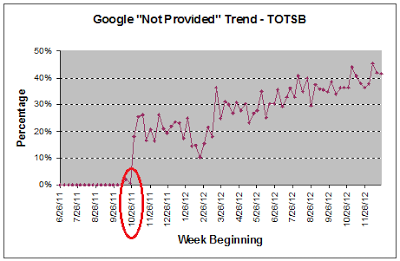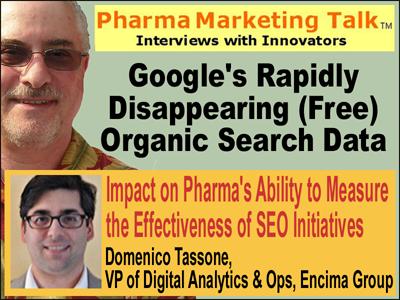Google’s Rapidly Disappearing (Free) Organic Search Data Impact on Pharma’s Ability to Measure the Effectiveness of SEO InitiativesClick Here for Additional Resources
A conversation with Domenico Tassone, Vice-President of Digital Analytics & Operations at The Encima Group (see Bio), about the privacy setting introduced by Google last year, which now lists referring keywords from organic search as “not provided,” and what this means for pharmaceutical marketers who need to measure the effectiveness of their search engine optimization (SEO) initiatives.
Aired LIVE on: Tuesday, February 5, 2013
Listen to internet radio with Pharmaguy on Blog Talk Radio
You can visit this Pharma Marketing Talk Segment Page and listen to the LIVE or archived audio podcast. This show and ALL Pharma Marketing Talk shows are available as podcasts via PMT on iTunes (FREE!).
Background
Search engines such as Google are key drivers to web sites such as pharmaceutical product sites. Pharmaceutical marketers rely on understanding how keywords drive visitors to their sites through both paid ads and through “organic search” results. Without this understanding, it is difficult to optimize websites so that they attract a targeted audience such as patients seeking specific information related to drug products or disease information.
You can use Google Anlaytics to find out which keywords are driving people to your website via organic search. Starting in 2011, Google introduced a “privacy setting”, which now lists referring keywords from organic search as “not provided.” This makes it difficult to learn about the most effective organic search referral keywords.
If you too, have been having trouble understanding your organic search traffic with continued growth in “not provided”, you are not the only one. The global change was done under the auspices of “security” but had the “back-handed benefit of hampering digital marketers understanding of the very organic keywords that were used to find their sites from the search engine,” says Domenico Tassone, Vice-President of Digital Analytics & Operations at The Encima Group. “It is a classic algorithm: 3-for-me-and-1-for-you.”

A Novemver, 2012, study by Optify shows that since the inception of Google’s privacy setting in 2011, the “not provided” rate (the percent of blocked referrer data from Organic search) has increased by 171 percent to account for almost 40 percent of referring keywords to B2B sites.
“Referrer data from organic search is quickly disappearing, and we believe that soon the majority of referring keywords will be listed as ‘not provided,'” said Rob Eleveld, CEO of Optify. “This is yet another example of how the SEO practice is at the mercy of search engines . . .”
Questions/Topics Discussed
- Explain the importance of keyword referral data and what Google did to limit access to these data.
- In your opinion, why did Google do this?
- What impact, if any, will it have on pharmaceutical marketers? After all, they pay for keywords don’t they?
- What advice do you have for pharmaceutical marketers regarding search engine marketing?
Guest Bio

Domenico Tassone, Vice-President of Digital Analytics & Operations at The Encima Group, leads the analyst and operations consultant teams across several clients. He brings almost 20 years of hands-on Internet/online marketing experience to client’s analytics challenges.
Prior, he was Director of Digital Adverlytics at Sears Holdings where he managed analysis and reporting for over 25 billion ad impressions and several hundred campaigns. While there he spearheaded the retailer’s move to data-driven ad targeting and advanced attribution. Before Sears, Domenico was lead analyst with The Encima Group focused on Bristol-Myers Squibb’s digital marketing business.
As Chief Collaborator with the Viewthrough Measurement Consortium, Domenico is working with top digital advertising and analytics companies to standardize this very important but often misunderstood metric.
Additional Resources









![6 Digital Tools at the Center of Healthcare Digitalization [INFOGRAPHIC]](http://ec2-54-175-84-28.compute-1.amazonaws.com/pharma-mkting.com/wp-content/uploads/2021/04/6DigitalTools_600px-100x70.jpg)




